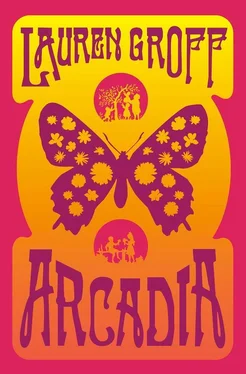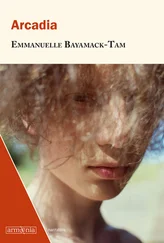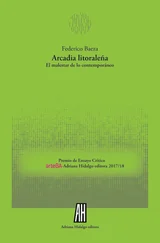Lauren Groff - Arcadia
Здесь есть возможность читать онлайн «Lauren Groff - Arcadia» весь текст электронной книги совершенно бесплатно (целиком полную версию без сокращений). В некоторых случаях можно слушать аудио, скачать через торрент в формате fb2 и присутствует краткое содержание. Год выпуска: 2012, Издательство: Hachette Books, Жанр: Современная проза, на английском языке. Описание произведения, (предисловие) а так же отзывы посетителей доступны на портале библиотеки ЛибКат.
- Название:Arcadia
- Автор:
- Издательство:Hachette Books
- Жанр:
- Год:2012
- ISBN:нет данных
- Рейтинг книги:3 / 5. Голосов: 1
-
Избранное:Добавить в избранное
- Отзывы:
-
Ваша оценка:
- 60
- 1
- 2
- 3
- 4
- 5
Arcadia: краткое содержание, описание и аннотация
Предлагаем к чтению аннотацию, описание, краткое содержание или предисловие (зависит от того, что написал сам автор книги «Arcadia»). Если вы не нашли необходимую информацию о книге — напишите в комментариях, мы постараемся отыскать её.
Arcadia — читать онлайн бесплатно полную книгу (весь текст) целиком
Ниже представлен текст книги, разбитый по страницам. Система сохранения места последней прочитанной страницы, позволяет с удобством читать онлайн бесплатно книгу «Arcadia», без необходимости каждый раз заново искать на чём Вы остановились. Поставьте закладку, и сможете в любой момент перейти на страницу, на которой закончили чтение.
Интервал:
Закладка:
Bit surprises himself by interrupting what Abe has been saying, something about curmudgeonly old Titus winning a thousand bucks from a lottery ticket. His voice is loud and fast with an urgency that startles Grete out of her dreamy play.
Abe, he says, it wasn’t the country that was so beautiful about the whole Arcadian experiment, don’t you see? It was the people, the interconnection, everyone relying on everyone else, the closeness. The villages are all dying now, small-town America is dying, and the only place where the same feeling exists now is here, in the city, millions of people all breathing the same air. This, here, now, is more utopia than utopia, more than your pretty little house out in the middle of the forest with only woodchucks for neighbors. Can’t you see? All of we kids are here, almost all of the kids from Arcadia, are here in the city. We’ve gone urban because we’re all looking for what we lost. This is the only place that approximates it. The closeness. The connection. Do you understand? It doesn’t exist anymore anywhere else.
He feels himself close to tears. The others stare at him. Grete puts down her fork and slides off her chair and climbs into Bit’s lap and pats his cheeks with her starfish hand. His parents send looks across the table to one another, as if to say, He’s finally going off the rails.
I’m not going off the rails, he says.
We never said you were, they say at once, and smile at each other. Jinx, says Hannah. You owe me a sodapop, says Abe, and they laugh in relief that they have deflected Bit, at least for now, at least a little.
Classes are like shoals of fish, Bit thinks at this week’s photography critique: something hungry gets into them and they surpass their natural speed. Sylvie’s group has begun to astound him. Their subjects are adult, deeply thought, riskier than undergraduates usually work (one boy takes photos of his little cousins in the bathtub, flirting with the line between art and child pornography; one girl takes a series of hands disappearing into the folds of fabric, silks and burlaps and muslins and cotton wool, gorgeously sensuous). There is a strange heat in the room whenever he enters it. And Sylvie of the shredded teeshirts, the knee-high boots, Sylvie whose face is so naked and pleading, smiles and praises when praise is due, and when it isn’t, she looks at Bit and holds her tongue and seems to be saying, Go on, please. I’m waiting.
It is a year to the day that Helle went missing. Bit hires a baby-sitter and takes Sharon from downstairs to dinner.
Are you sure? she said this morning, handing him the coffee, trying to keep from looking too pleased. This could ruin everything, you know. She passed her hand through her short black hair, blinked her dark eyelashes prettily.
I’m sure, he said and carried her smile with him through the day.
They go to the Italian place down the way. The food isn’t wonderful, but it is fine: Chianti out of straw-trousered bottles, fettuccine Alfredo, cannoli. It feels odd, good, to walk with a woman who is smaller than he is, even in heels. Sharon looks surprisingly beautiful tonight in her neat blue dress, sleeveless to show off her sharp shoulders, her face carefully outlined with makeup. She smiles a lot. Only her hands are nervous, patting the menu, straightening the silverware, plate, votive again and again.
They talk about the children, about their exes, about the weather. They relax. Now they’re on the subject of books. Without other media, never a television, never a computer, books have always made up much of Bit’s life. Sharon leans forward, her brownish lipstick worn off at the center of her lips. Her eyes kindle. She begins talking about Ayn Rand.
She changed my life, she says breathlessly. Howard Roark! Dominique Francon! Ayn is the greatest philosopher of the twentieth century. Objectivism. I read Atlas Shrugged in college and thought, Oh, my God, everything’s coming into focus, finally. You know what I mean?
Bit listens, trying to make his face neutral. And talks, in turn, about George Eliot, whom Sharon had never heard of. If we had a keen vision and feeling of all ordinary human life, he quotes, it would be like hearing the grass grow and the squirrel’s heart beat, and we should die of that roar which lies on the other side of silence.
Sharon takes a long slow sip of wine. I don’t get it, she says finally.
They go back to Sharon’s apartment. Frankie and Grete are asleep upstairs at Bit’s, with the babysitter. Sharon’s place has the same floor plan as Bit’s, and it is almost as bare as his, as if she, too, had been reared in a bread truck the size of a closet. But Bit’s has color and comfort and heat, and Sharon’s is white and very cold. Sorry it’s so chilly, she calls from the bathroom. When Frankie’s not here, I turn down the thermostat. Saving pennies. Times are tight.
When she comes back, she sits next to Bit and without much ado presents her mouth to be kissed. She is a good kisser, involved and slow. Her belly is slightly springy to the touch, but warm.
Bit extracts himself. I’m sorry, he says.
Oh. Me too, she says glumly. She bites her cuticles. I’m not beautiful like your ex.
No, he says, and when she looks startled, he says, Oh, yes you are. I meant, no, that’s not it. It just doesn’t feel right to me.
They hold hands and listen to the clock on the mantel ticking. They can hear the baby-sitter upstairs, the movie playing on her laptop.
He says, I think it was the Ayn Rand.
Sharon laughs and laughs, and when she stops, she squeezes his forearm. Oh, I always seem to have a hopeless crush on you handsome bleeding-heart liberals. I need to find me a nice old conservative.
Good luck in this city, he says, standing. If you want, I’ll carry Frankie down.
Well. Could you let him sleep? she says. If you don’t mind watching the kids, I’ll call a friend and go out on the town. The night’s still young. And so are we.
You are, he says.
You will be young again someday, too. If you let yourself, she says, and she gives him a sisterly kiss on the cheek. Now scram. I have to get on my dancing duds. He climbs the stairs and imagines Sharon in some flashing club, closing her eyes to the music, something throwbacky, full of synth and falsetto, and wishes that she could have been different than she was, a thinker; or, better, that he could have relaxed his personal code and pretended to be a different man than he is, even for the space of one night.
He goes to his last classes of the semester and collects the portfolios. His students, suddenly beautiful and dear to him, thank and touch him as they file out the door. Claps on the shoulder, hugs, handshakes. Their warmth surprises him. He thinks of himself as strict, not the kind of professor to whom anyone would feel close.
Free, he spends an hour wandering. He feels the urge to look for something, but needs nothing; he goes into and out of stores, buys a cookie and a toothbrush and a penguin for the bathtub for Grete.
Finally, he sits in the train station, watching the people go back and forth.
Once, when he was on a shoot in Europe, he went off for a few days at the end to travel. In a Swiss station filled with honey wood and clerestory light, he saw a woman on a bench, weeping. She was enormous; pieces of her hung over the armrests and into the surrounding seats. She wore a smock printed with faded blue puppies and Chinese slippers with spangles, and her feet looked like baked potatoes split out of their skins. But her hair was upswept elaborately as if she were about to attend the opera, and the hands she held in prayer before her mouth were small as finches.
Bit stood, frozen in the current of people, watching her. Not a soul stopped to ask what was wrong. He moved in indignation toward the crying woman; the crowd parted. When he was very close, he saw the broad straw hat upended and the sign propped on the woman’s belly: Weeping Woman , it said in four languages: Femme Sanglotante; Donna Piangente; Weinende Frau . The clock struck a ponderous hour. The pigeons in the rafters lifted and settled. The weeping woman turned off her sobs like water from a faucet and gathered her sign and hat. In a blink, the great mass of her dissolved into the crowd, and Bit was alone again.
Читать дальшеИнтервал:
Закладка:
Похожие книги на «Arcadia»
Представляем Вашему вниманию похожие книги на «Arcadia» списком для выбора. Мы отобрали схожую по названию и смыслу литературу в надежде предоставить читателям больше вариантов отыскать новые, интересные, ещё непрочитанные произведения.
Обсуждение, отзывы о книге «Arcadia» и просто собственные мнения читателей. Оставьте ваши комментарии, напишите, что Вы думаете о произведении, его смысле или главных героях. Укажите что конкретно понравилось, а что нет, и почему Вы так считаете.

![Andrea Höst - In Arcadia [Touchstone - Extras]](/books/56405/andrea-host-in-arcadia-touchstone-extras-thumb.webp)










